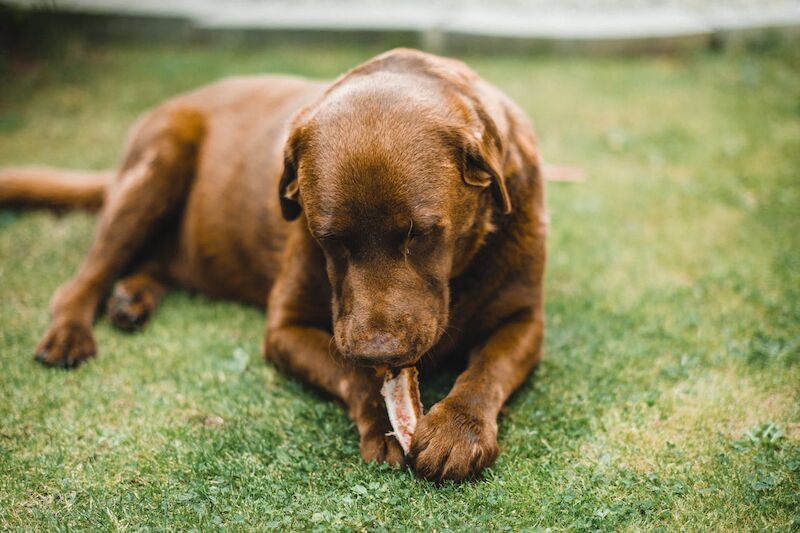Labradors are known for their boundless energy, loyalty, and love for food. However, some Labradors can develop food allergies, which can be distressing for both the dog and its owner. Understanding the signs, causes, and solutions for food allergies is essential for managing your Labrador’s health and ensuring they enjoy a balanced and comfortable life.
In this article, we’ll explore everything you need to know about food allergies in Labradors, including how to recognize symptoms and what steps to take to manage the condition.
What Are Food Allergies in Labradors?
Food allergies in Labradors occur when their immune system mistakenly identifies certain food ingredients as harmful, triggering an allergic reaction. This reaction can cause a variety of symptoms, ranging from skin irritations to digestive issues. While food allergies are relatively uncommon in dogs, Labradors can be more susceptible due to their genetic makeup and love for food.
Common Symptoms of Food Allergies
Food allergies can manifest in various ways, and symptoms may differ between Labradors. It’s essential to pay close attention to your dog’s behavior and physical health, as food allergies can often be mistaken for other conditions like seasonal allergies or intolerances.
Here are some common symptoms of food allergies in Labradors:
- Itchy skin: Labradors with food allergies may scratch excessively, particularly around the ears, paws, and belly.
- Ear infections: Recurrent ear infections are a common sign of food allergies, especially if they occur alongside itchy skin.
- Gastrointestinal issues: Vomiting, diarrhea, gas, or bloating can indicate a food allergy in your Labrador.
- Chronic licking or chewing: Labradors with food allergies may constantly lick or chew at their paws, leading to red, irritated skin.
- Red or inflamed skin: Skin rashes or inflammation, particularly around the face, ears, and belly, can be a sign of a food allergy.
If your Labrador is displaying any of these symptoms, it’s essential to consult with a veterinarian to rule out other causes and confirm whether a food allergy is the culprit.
Common Food Allergens for Labradors
Labradors can develop allergies to various ingredients commonly found in dog food. The most common food allergens include:
- Beef: One of the most common proteins that can cause food allergies in Labradors.
- Chicken: While widely used in dog food, chicken can trigger allergic reactions in some dogs.
- Dairy: Some Labradors are lactose intolerant or allergic to dairy products like cheese or milk.
- Grains: Ingredients such as wheat, corn, and soy can cause allergic reactions in some Labradors.
- Eggs: Another protein source that may trigger food allergies in Labradors.
It's essential to note that while grains are often blamed for food allergies, the majority of food allergies in dogs are triggered by proteins, particularly those found in meat.
Diagnosing Food Allergies in Labradors
Diagnosing food allergies in Labradors can be challenging, as it requires a process of elimination. Your vet may recommend an elimination diet, where you gradually remove potential allergens from your Labrador’s diet and monitor their symptoms. This involves feeding your dog a novel protein and carbohydrate source (such as venison and sweet potato) that they haven’t consumed before.
Here’s how an elimination diet works:
- Remove potential allergens: Switch to a limited-ingredient diet that avoids common allergens such as beef, chicken, and grains.
- Monitor for improvement: Over several weeks, observe if your Labrador’s symptoms improve or disappear.
- Reintroduce ingredients: Gradually reintroduce ingredients one at a time to determine which one triggers the allergic reaction.
By following this method, you can identify the specific ingredient causing your Labrador’s allergy and avoid it in the future.
Managing Food Allergies in Labradors
Once you’ve identified the ingredient your Labrador is allergic to, managing their condition becomes much easier. Here are some practical steps to take:
Switch to hypoallergenic or limited-ingredient dog food: These types of food are formulated without common allergens and focus on using novel proteins like duck, lamb, or salmon. Many owners find success using a high-quality, grain-free diet to manage their Labrador’s food allergies.
If you’re looking for food options, check out our feeding guide for Labradors of all ages, which provides recommendations for hypoallergenic diets.
Avoid table scraps: Feeding your Labrador human food can introduce allergens that trigger a reaction. Stick to high-quality dog food and healthy, dog-safe treats.
Monitor treats and chews: Some treats and chews may contain hidden allergens. Always check ingredient labels and avoid products with the known allergen.
Work with your vet: Food allergies can sometimes require ongoing management, so it’s important to maintain regular check-ups with your vet to monitor your Labrador’s health.
Preventing Food Allergies in Labradors
While it may not be possible to prevent food allergies entirely, there are steps you can take to reduce the risk. Feeding your Labrador a balanced, high-quality diet from an early age can help promote overall health and reduce the likelihood of developing allergies. If you’ve adopted a fox red Labrador or a black Labrador puppy, introducing them to a variety of proteins and carbohydrates during their early months can help reduce the chance of them developing food sensitivities later in life.
Additionally, avoid overfeeding your Labrador, as obesity can exacerbate allergy symptoms and contribute to other health problems like joint issues and diabetes.
Conclusion
Food allergies in Labradors can be frustrating, but with the right approach, you can manage your dog’s condition and help them live a comfortable, healthy life. By identifying the allergen through an elimination diet and switching to a hypoallergenic or limited-ingredient food, you can keep your Labrador free from symptoms like itchy skin and digestive discomfort.
If you’re looking for guidance on what to feed your dog, check out our Labrador feeding guide or explore listings for Labrador puppies for sale in locations like London or Manchester to find your next healthy companion.
